Scoutmaster Musings
Archives:
2023 2022 2021 2020 2019 2018 2017 2016 2015 2014 2013 2012 2011 2010 2009 2008 2007 2006 2005
Reaching Eagle

It's often the goal of a scout (and/or his parents) that he "get his Eagle". That's the way I most often hear it phrased - "getting" his Eagle. Earning, achieving, and completing aren't used much - it's "getting". When it comes up in conversation, I usually offer my view of advancement as, "a method we use to help scouts reach goals, but not a goal itself." I think that fits with the BSA program pretty well. I don't push scouts very much on advancement, but the troop has a program that provides opportunity to advance quickly.
Advancement is the most visible way we have in scouting to measure a scout's progress. It provides tangible recognition for achieving standard requirements. It allows peers to compare themselves. It requires effort and results. But, since advancement is a method and not a goal (or Aim), it really does not amount to success. A scout can be a model of a fit citizen of high character and never advance past First Class. It's important to keep that in mind when encouraging scouts to advance in rank.
But, since "getting" Eagle is on the minds of many people, I made a simple chart for a scout (and his parents) to see how he is progressing through ranks toward that goal of his. The 'Optimal Path' gets a scout to Eagle in time for him to give back to the troop with no pressure of advancing for a couple years. The 'Slow Progress' area means he's going to need to step it up to make it. I think 'Eagle Out of Reach' probably needs no explanation. A scout can check on progress at a glance and alter his plan as he feels is needed. Click the image to see a larger view.
The majority of scouts in our troop experience advancement fairly close to the orange line with a couple bumping against the green line. Motivated boys could join a troop at the end of their 9th grade year and earn Eagle rank. If they start after their 16th birthday, there's not much chance of progressing through all the ranks in time.
I think it would be a fun experience to have a 15 year old boy join the troop and earnestly go for his Eagle. Have you ever had that happen? Did he make it?
Scout On
| Leave Comment |
Posted: 17:03 02-01-2011 562
Expertise, Sense, and Knowledge
They tell me BSA doesn't stand for "Baby Sitters of America" but, much like a trusted babysitter, adult volunteers do take on the responsibility of keeping youth safe. Their parents expect us to have expertise, sense, and knowledge enough to return the same number of scouts we started with, in pretty much the same condition. I feel that is a reasonable expectation, don't you?
So, how do we know how to keep our scouts safe?
 Expertise comes from experience. You need to actually do stuff in order to be an expert at it. How do you know if a scout is using a knife, stove, rope, or other gear safely unless you are experienced with using it? You don't! You have to actually use the gear yourself first. You can't evaluate the fit and security of hiking boots, backpacks, climbing ropes, life jackets, ... by just reading about it. You can't hike 50 miles, ski a black diamond, or do a one-arm handstand without the experience of building skills to an expert level. We need to continually expand our skills and abilities in order to offer an exciting, safe program for scouts.
Expertise comes from experience. You need to actually do stuff in order to be an expert at it. How do you know if a scout is using a knife, stove, rope, or other gear safely unless you are experienced with using it? You don't! You have to actually use the gear yourself first. You can't evaluate the fit and security of hiking boots, backpacks, climbing ropes, life jackets, ... by just reading about it. You can't hike 50 miles, ski a black diamond, or do a one-arm handstand without the experience of building skills to an expert level. We need to continually expand our skills and abilities in order to offer an exciting, safe program for scouts.
 Sense develops from experience also. Normally, a more mature person makes more careful decisions - this is termed 'common sense'. Boys the age of scouts often don't think things through before making a decision, taking a step, or a flying leap. As adult volunteers, we need to keep a wide-lens view of our activities and step through all the things that might go wrong in our mind before actually trying them for real.
Sense develops from experience also. Normally, a more mature person makes more careful decisions - this is termed 'common sense'. Boys the age of scouts often don't think things through before making a decision, taking a step, or a flying leap. As adult volunteers, we need to keep a wide-lens view of our activities and step through all the things that might go wrong in our mind before actually trying them for real.
I try to ask myself, "What's the worst thing that could happen?" If it's not a serious injury, I get ready to help if needed and see how it plays out. In my sense of safety, climbing trees, crossing streams, swinging from ropes, playing with sticks, throwing small rocks can be done safely. I know all those things could result in serious injury, but so can standing up in a bathtub or walking down your stairs. It is a remote chance. Other activities, such as climbing on the roof, swimming in rapids, and walking the yellow line down the middle of the highway have a higher chance of injury so I would use my sense and say, "Nope!"
 Knowledge can be obtained many different ways. Experiencing actual situations provides knowledge, but that's not the best way to know how to splint a sprained joint or tie a climber into a harness. We can all increase our knowledge through Training so we know what to do even though we have no experience. I know how to do CPR even though I've never done it on anyone. I was trained on climbing knots before I actually used them. I know 'theoretically' about many things that could happen but have not happened yet and most likely never will.
Knowledge can be obtained many different ways. Experiencing actual situations provides knowledge, but that's not the best way to know how to splint a sprained joint or tie a climber into a harness. We can all increase our knowledge through Training so we know what to do even though we have no experience. I know how to do CPR even though I've never done it on anyone. I was trained on climbing knots before I actually used them. I know 'theoretically' about many things that could happen but have not happened yet and most likely never will.
Maintaining a sense of safety while expanding a base of knowledge from training into expertise through practice is a great way to prepare to keep the youth you take out on adventures safe from harm. From their point of view, it's all still dangerous and exciting. From your point of view, it's all under control. And, from the parents' point of view, you are adequately prepared to fufill their expectations.
Scout On
Challenge your Scouts
So, how do we know how to keep our scouts safe?
 Expertise comes from experience. You need to actually do stuff in order to be an expert at it. How do you know if a scout is using a knife, stove, rope, or other gear safely unless you are experienced with using it? You don't! You have to actually use the gear yourself first. You can't evaluate the fit and security of hiking boots, backpacks, climbing ropes, life jackets, ... by just reading about it. You can't hike 50 miles, ski a black diamond, or do a one-arm handstand without the experience of building skills to an expert level. We need to continually expand our skills and abilities in order to offer an exciting, safe program for scouts.
Expertise comes from experience. You need to actually do stuff in order to be an expert at it. How do you know if a scout is using a knife, stove, rope, or other gear safely unless you are experienced with using it? You don't! You have to actually use the gear yourself first. You can't evaluate the fit and security of hiking boots, backpacks, climbing ropes, life jackets, ... by just reading about it. You can't hike 50 miles, ski a black diamond, or do a one-arm handstand without the experience of building skills to an expert level. We need to continually expand our skills and abilities in order to offer an exciting, safe program for scouts. Sense develops from experience also. Normally, a more mature person makes more careful decisions - this is termed 'common sense'. Boys the age of scouts often don't think things through before making a decision, taking a step, or a flying leap. As adult volunteers, we need to keep a wide-lens view of our activities and step through all the things that might go wrong in our mind before actually trying them for real.
Sense develops from experience also. Normally, a more mature person makes more careful decisions - this is termed 'common sense'. Boys the age of scouts often don't think things through before making a decision, taking a step, or a flying leap. As adult volunteers, we need to keep a wide-lens view of our activities and step through all the things that might go wrong in our mind before actually trying them for real. I try to ask myself, "What's the worst thing that could happen?" If it's not a serious injury, I get ready to help if needed and see how it plays out. In my sense of safety, climbing trees, crossing streams, swinging from ropes, playing with sticks, throwing small rocks can be done safely. I know all those things could result in serious injury, but so can standing up in a bathtub or walking down your stairs. It is a remote chance. Other activities, such as climbing on the roof, swimming in rapids, and walking the yellow line down the middle of the highway have a higher chance of injury so I would use my sense and say, "Nope!"
 Knowledge can be obtained many different ways. Experiencing actual situations provides knowledge, but that's not the best way to know how to splint a sprained joint or tie a climber into a harness. We can all increase our knowledge through Training so we know what to do even though we have no experience. I know how to do CPR even though I've never done it on anyone. I was trained on climbing knots before I actually used them. I know 'theoretically' about many things that could happen but have not happened yet and most likely never will.
Knowledge can be obtained many different ways. Experiencing actual situations provides knowledge, but that's not the best way to know how to splint a sprained joint or tie a climber into a harness. We can all increase our knowledge through Training so we know what to do even though we have no experience. I know how to do CPR even though I've never done it on anyone. I was trained on climbing knots before I actually used them. I know 'theoretically' about many things that could happen but have not happened yet and most likely never will.Maintaining a sense of safety while expanding a base of knowledge from training into expertise through practice is a great way to prepare to keep the youth you take out on adventures safe from harm. From their point of view, it's all still dangerous and exciting. From your point of view, it's all under control. And, from the parents' point of view, you are adequately prepared to fufill their expectations.
Scout On
Challenge your Scouts
| Leave Comment |
Posted: 23:33 01-28-2011 561
Snow Fun
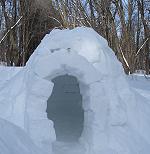 This was the perfect weekend for tons of snow fun! The snow pack has been building for the past month or so and we finally had plenty to build quinzees with snow to spare. The temperature ranged from 10F down to -15F during our campout.
This was the perfect weekend for tons of snow fun! The snow pack has been building for the past month or so and we finally had plenty to build quinzees with snow to spare. The temperature ranged from 10F down to -15F during our campout.In past outings, the snow depth was not enough to cut blocks, but this year I finally got to complete my snow block shelter and here it is. I still needed to finish the door at this point.
Not like an igloo which requires larger blocks tapered and banked, this hut has vertical walls with the last few layers starting to lean in. It then has rows of two blocks leaning together at the top to make a vaulted ceiling. This uses less snow than a quinzee and I think it is less work and more fun. Certainly more room inside. I shoveled snow all over it to fill the cracks.
Friday night, I slept in it before the roof was put on. Saturday night, two scouts borrowed it since their shelter collapsed while they were digging it out. That's their story anyway and they're sticking to it. :-)
Most of the experienced scouts are skilled in making quinzees, but I'm hoping next year some of them might try a block house since there were some interested observers. If nothing else, they enjoyed smashing it on Sunday.
In all, the scouts built 8 quinzees and 14 scouts slept out - the rest opted for the indoor shelter.
Scout On
| Leave Comment |
Posted: 0:22 01-26-2011 560
Top 10 Benefits of Small Troops
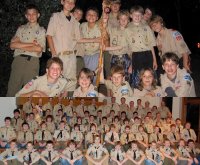 The BSA says that the average Boy Scout troop size is 14 scouts. Lord Baden-Powell is attributed with stating the optimum troop size to be around 32 scouts. Depending on what other activities are available for boys in your area, I believe that number of 32 is close to optimum today. If your scouts tend to participate in half your activities and meetings, then the number could climb to about 50 scouts. More than that and the value to an individual scout from scouting diminishes rapidly and the efforts required of volunteers rises disproportionately. The picture at the right is of a 14-member troop and a 50-member troop - which one looks more fun?
The BSA says that the average Boy Scout troop size is 14 scouts. Lord Baden-Powell is attributed with stating the optimum troop size to be around 32 scouts. Depending on what other activities are available for boys in your area, I believe that number of 32 is close to optimum today. If your scouts tend to participate in half your activities and meetings, then the number could climb to about 50 scouts. More than that and the value to an individual scout from scouting diminishes rapidly and the efforts required of volunteers rises disproportionately. The picture at the right is of a 14-member troop and a 50-member troop - which one looks more fun?Here are 10 Benefits of smaller troops (15-45 scouts) over larger ones (60+ scouts):
- Hunger - By being smaller, there is a desire to grow. Scouts have a reason to invite their friends to join. If it already feels crowded and 'full', scouts don't want to grow. The current scouts are also less welcoming to new scouts joining the troop because it means more crowding. More potential scouts are never asked to join.
- Success - With 40 scouts, the SPL has about 5 or 6 patrols to direct - a reasonable number. He can personally drive the troop to his goals. When an SPL must manage 8 or 10 patrols, the amount of time required becomes exhorbitant. His scouting competes with his schoolwork and his role becomes a job. This results in no scouts willing to take on the huge time commitment or adults taking on more of the logistics and the SPL becoming a figurehead.
- Mob Anonymity - Chaos thrives in larger numbers. I can get away with more bad behavior when no one can see me. I can go along with others when I'm just one of the herd. A smaller group allows the leaders to notice who is doing what, good or bad. It allows a scout to excel and be noticed, rather than do his best time after time and not be recognized in the crowd. When the SPL raises the sign, it takes a larger group longer to quiet, raising the frustration level and wasting time.
- Making a Difference - One scout out of 75 not pulling his weight can be absorbed by the rest and he can coast. In a group of 20, every person is important and needs to be relied upon. A larger troop meets the needs of lazy boys that want to just slide by.
- Time Commitment - There is a certain amount of time required of the scoutmaster to develop a relationship with a scout. It takes the scoutmaster 10 minutes to just say "HI" and shake hands with each scout if there are 50 scouts present. With more scouts, the relationships do not develop. Studies have shown that an individual can only handle a certain number of friends and acquaintances - and Facebook friends are not really friends.
- Camping - It is much easier to find a location for 3 vehicles and 15 people than 10 vehicles and 50 people. Leave No Trace suffers with larger numbers. Patrols tend to camp much closer together to each other and to adults in larger troops. The probability of actually experiencing any wildlife drops rapidly as a group grows.
- Challenge - Only one person can be first to ride the rapids or swing on a rope or shoot a gun or whatever the exciting thing is to do. With a larger group, people have to wait their turn longer and the thrill of something new evaporates as we see others doing it before us.
- Efficiency - The inefficiency of the patrol method becomes more obvious as a troop grows. It makes more sense to combine patrols, buy and cook food for everyone, have one adult manage the gear, and hundreds of other ways to make an outing more efficient. The leadership opportunities for scouts are reduced in proportion to the efficiency introduced by adults.
- Tardiness - A parent will occasionally be late picking up a scout from a meeting. If a family is late once a year, that seems like no big deal to the family. But, if every family is late once a year in a troop with 60 scouts, the scoutmaster and another adult wind up waiting after EVERY meeting. The same holds for camping departures and returns.
- Consistency - A scoutmaster with a handful of assistants can easily chat about challenges in the troop, intepretation of requirements, goals for the scouts, and other general directions for the troop. As more adults are involved, individuals promote their own agendas, interpretations, and values which may be contrary to the overall troop's direction. More formal meetings are required for the adults to ensure everyone agrees to the same goals. Even after a general consensus, individuals may still do their own thing in a rogue manner. In a large troop, the scoutmaster can become a manager of adults to whom he has distributed the direct scout interaction, rather than being a role model, mentor, and friend to the scouts.
What did I miss?
Scout On
Challenge your Scouts
| See 5 comments | Leave Comment |
Posted: 10:50 01-25-2011 559
A Hero
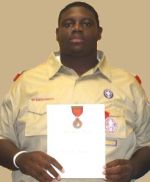 So, what do you do when someone runs their car into yours while you're driving your mom around?
So, what do you do when someone runs their car into yours while you're driving your mom around?Well, if you're Justin Jackson of Troop 797 in Florida, you follow the Scout Oath and "help other people at all times" and in the process earn the BSA's highest lifesaving award - the Honor Medal with Crossed Palms.
Congratulations, Justin!
Read more...
In 2009, there were 16 Honor Medals with Crossed Palms awarded and just over 230 since it was created in 1924.
Challenge your Scouts
| Leave Comment |
Posted: 8:54 01-17-2011 558
BSA Medical Requirements
 In November, some changes were made to the BSA medical form requirements. In case you haven't heard, the one BSA medical form can now be used at all BSA high adventure bases, according to scouting.org information. The one form is also used by everyone, regardless of age.
In November, some changes were made to the BSA medical form requirements. In case you haven't heard, the one BSA medical form can now be used at all BSA high adventure bases, according to scouting.org information. The one form is also used by everyone, regardless of age.Here's the latest on scouting.org :-
A key requirement for us is that units need to use the height/weight limits when an event takes participants more than 30 minutes away from an emergency vehicle-accessible roadway. In our troop's case, that is often since we backpack, canoe, and other wild outings.
Our troop has a volunteer to manage health and medical form compliance. Keeping track of the changes and making sure everyone is up-to-date is a significant role tha I appreciate someone else handling. :-)
Challenge your Scouts
| Leave Comment |
Posted: 23:03 01-16-2011 557
Camping in Cold
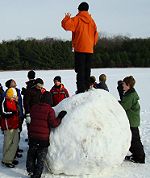 Being one of the best troops around, your troop camps rain or shine, hot or cold. Depending on where you are, the 'cold' might be 40 degrees or -40 degrees. Here in Minnesota, our council has a Zero Hero award for scouts that camp out in below 0F temps, but many councils have an award for camping below freezing. Lots of councils call it their Polar Bear award which sounds kind of funny up north here.
Being one of the best troops around, your troop camps rain or shine, hot or cold. Depending on where you are, the 'cold' might be 40 degrees or -40 degrees. Here in Minnesota, our council has a Zero Hero award for scouts that camp out in below 0F temps, but many councils have an award for camping below freezing. Lots of councils call it their Polar Bear award which sounds kind of funny up north here.Whatever the temperature, cold weather camping requires additional training and equipment from the more comfortable summer campouts. It also might be a challenge to make a cold winter campout much fun since the cold can be uncomfortable. Some winter camping ideas are the usual skiing, sledding, or snowshoeing but those can get 'old hat' after awhile. A great solution is to hold a Klondike Derby for your own troop, other troops in the community, or your entire district. You don't really need snow to hold a Klondike - just modify some of the activities.
To prepare for and enjoy a simple weekend winter campout, here are a few ideas:
- Ice Rescue - troop meeting activity to prepare
- Winter Camping Tips - tips for your instructors to teach the newbies.
- Snow Snakes - patrols make and race their wooden snakes.
- Fox Hunt - tracking activity in the snow.
- Shaggy Dog, How Bear Lost His Tail, Turtle Races Bear, Origin of Summer and Winter, How Coyote Stole Fire - winter stories
- Hawk and Waterfall - a scoutmaster minute
- Ice Fishing - a funny skit
Scout On
Challenge your Scouts
| Leave Comment |
Posted: 9:17 01-14-2011 556
Bears Start Saving Now
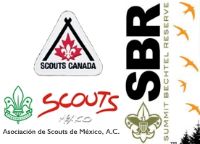 All those Bear, Wolf, and Tiger cub scouts had better start selling popcorn and saving their allowance now. The 24th WORLD Jamboree will happen at The Summit in West Virginia in 2019.
All those Bear, Wolf, and Tiger cub scouts had better start selling popcorn and saving their allowance now. The 24th WORLD Jamboree will happen at The Summit in West Virginia in 2019.All current Boy Scouts and even most Webelos will have aged out by then, but it's sure excitng news. Scouts Canada, Scouts de Mexico, and the BSA will jointly host the jambo and that sounds like a great way to build cross-border scouting on our continent.
Has your troop ever travelled to Canada or Mexico? How about working on an international trek North or South in 2016 or 2017 to become pals with some Mexican or Canadian troop?
Scout On
| Leave Comment |
Posted: 13:49 01-13-2011 555
Top 10 Dutch Oven Recipes
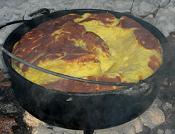 Six years ago, the troop had a single dutch oven that was rarely used. Last month, we had five patrols making dutch oven meals in a snow storm. :-)
Six years ago, the troop had a single dutch oven that was rarely used. Last month, we had five patrols making dutch oven meals in a snow storm. :-)This troop distributes gear to each patrol to manage by themselves. Each patrol that wants one has been issued a dutch oven from the quartermaster. With a little training on clean-up and storage, the D.O.s make a huge impact on the cooking creativity of the scouts. They get more practice building fires, which also means gathering enough good wood and starting it early enough for the meal. They use more fresh ingredients and do 'real cooking' rather than 'warming'.
Here are ten of the favorite recipes from the past year for you to try:
- PECS - filling breakfast meal
- doughnuts - fun and tasty
- monkey bread - this gets made by at least one patrol on every campout
- apple fluff - another sweet breakfast
- pizza - easy to make, but requires a couple dutch ovens for a patrol or a lot of patience
- cowboy stew - make sure you've got a good can opener and some hungry folks
- burger beans and biscuits - great cold-weather dinner
- black forest cobbler - easiest dessert to make ever. Supply different cake mixes, sodas, and fillings and see which taste the best.
- burritos - much better than fast food burritos
- enchiladas - currently my personal favorite
Scout On
Challenge your Scouts
| See 2 comments | Leave Comment |
Posted: 13:18 01-10-2011 554
Competing Troops
 We should all be trying to keep a scout active, engaged, and growing in character, citizenship, and fitness until he's an adult - that should be the mission of every troop. So, troops basically have identical goals. The way adult volunteers strive to reach the goals, and keep the goals clearly in sight, are what differ.
We should all be trying to keep a scout active, engaged, and growing in character, citizenship, and fitness until he's an adult - that should be the mission of every troop. So, troops basically have identical goals. The way adult volunteers strive to reach the goals, and keep the goals clearly in sight, are what differ.There happen to be nine troops within a 5-mile radius from my home. Scouts have a wide range of selection for the type of troop to join. When a Webelos scout "shops around" with his parents, he sees small and large troops, chaotic and quiet troops, crisp and scruffy troops, and hopefully one of those appeals to him and his folks.
I posted about competing scouts and warned about having a winner and many losers too often. Expanding the thought, what about competition between troops?
Camporees often have competitions between troops. A Klondike Derby usually has a race or challenge to gather the most gold rocks. These are fun, appropriate competitive activities for bragging rights and patrol/troop pride. Competition on this level helps scouts work on the Scout Law, especially trustworthy, loyal, friendly, courteous, kind, and obedient. But, outside of staged competitions, how should troops interact?
When troops compete for members, I think that is where we run into trouble. If you shower a Webelos with attention and trinkets and promises so he joins your troop, do you win? If someone joins a different troop, are you the loser? If you get 8 new scouts and the other troop gets 24, who's the winner? When the district report comes out and you have 2 new Eagles while the other troop has 12, who wins? The trouble starts when we get too caught up in the great American numbers game. To succeed, you need to grow. To win, you need to be the biggest. To be number one, you have to beat everyone else.
In Scouting, that is all wrong! Big is not the same as Good. Growth does not equal Success. Everyone really can be number one. Unfortunately, since the Boy Scouts of America is a big business, the "numbers game" exists at national, council, and district levels in the metrics of success. So, naturally, this seeps down to many individual units trying to earn the latest 'growth' recognition.
Wouldn't it be better if troops cooperated more? Heck, we're really all on the same team anyway. How can scoutmasters foster cooperation rather than competition between local troops?
- Know the other scoutmasters. Call and introduce yourself and ask if you can visit a troop meeting.
- Visit their troop meeting at least once a year. You can learn a ton about how well your troop is operating and you can pick up ideas.
- Offer joint-troop campouts. If their scoutmaster is game, see if your PLC wants to invite their troop to camp. This would be a good place for competition between all the various patrols of the troops.
- Invite them to participate in 'community-wide' rather than 'troop-only' recruiting for Webelos, such as a Scoutorama or "Meet the Troops" evening.
- Consider hosting a "Green Bar" or "Silver/Gold" party - all Patrol Leaders or just SPLs and ASPLs from all troops get together for pizza and then share Roses, Thorns, and Buds about their troops.
- Use your imagination - what other ideas do you have?
Scout On
Challenge Your Scouts
| See 1 comment | Leave Comment |
Posted: 17:53 01-07-2011 553
Spoof Merit Badges
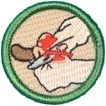
Have you ever purchased spoof merit badges?
I've looked at them and laughed at them online but was concerned the quality would be poor and they'd just be a waste of money. But, this past month the Boy Scout Store provided me with a selection of patches and they are great. My favorite is the one pictured here for 'finger carving'. :-)
My plan is to recognize scouts after campouts this year. Whether it's because they cooked a great dutch oven meal or were attacked by ferocious mosquitos or a few other occasions, I'm hoping the patches will be a bit of fun and maybe get a few more scouts to participate more.
Boy Scout Store also has Scout Coins which I started giving to new scouts last spring. They've been a very popular token with the scouts.
Scout On
| See 22 comments | Leave Comment |
Posted: 11:23 01-03-2011 552
Top 10 Time Wasters
 In even the best planned meeting or activity-packed outing, there may be slack time where scouts start getting bored, or scouts come a little early and have nothing to do. Here are ten ways to pass the time that can use any number of scouts and go on for any length of time. They are listed alphabetically, not by popularity.
In even the best planned meeting or activity-packed outing, there may be slack time where scouts start getting bored, or scouts come a little early and have nothing to do. Here are ten ways to pass the time that can use any number of scouts and go on for any length of time. They are listed alphabetically, not by popularity. - Finger Jousting
- Going Camping
- Ha!
- Hand Slap
- Hunker Down
- Kangaroo Wrestling
- Last Match
- Mafia
- Penny Pitching
- RPS Snake
Scout On
ScoutChallenge.com
| Leave Comment |
Posted: 10:21 12-30-2010 551
Previous PostsComments:
Feb 25, 2023 - Joe Patterson
Just out of curiosity, are the Rockwell paintings on exhibit anywhere
Mar 16, 2023 - Adam John
Great question Joe! Have you checked out the Norman Rockwell Museum in
Stockbridge MA? (nrm.org) There is also the Rockwell Museum in Corning
NY. (rockwellmuseum.org) I believe the latter has more art. Hope this
helps!
Jan 21, 2024 - Johnna Downing
The Scouting museum at Philmont, Cimmaron, NM hopefully has the ones that
used to hang at the museum in Irving, TX. Good luck. Johnna
Scouting 2024 - Ask a Question - Add Content
Just for Fun: Socializing merit badge




This site is not officially associated with Scouting America
Find more Scouting Resources at www.BoyScoutTrail.com
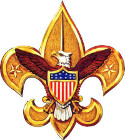


Follow Me, Scouts
Recent Comments